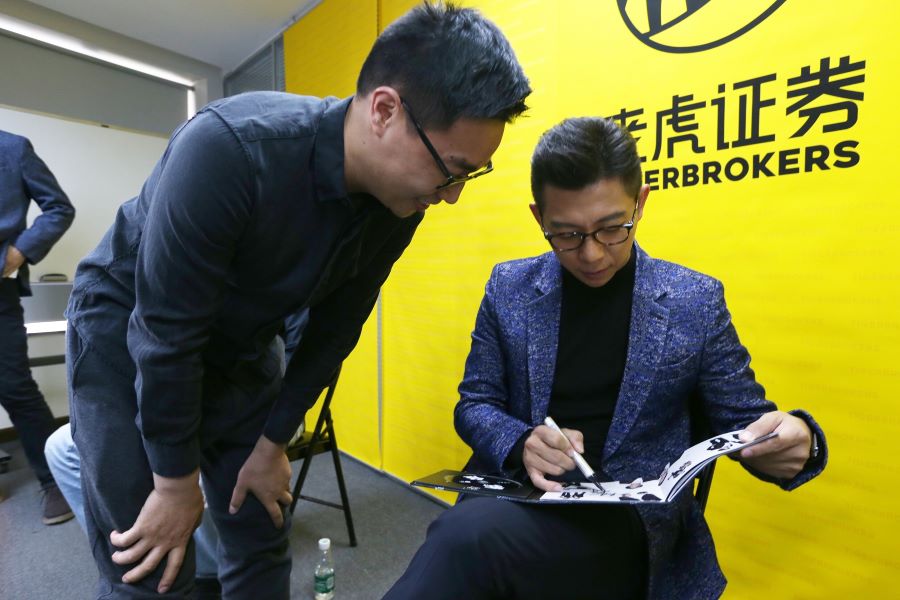UP Fintech Lurks Behind Launch of New ‘Blank Check Company’

Company better known as Tiger Brokers is getting a growing slice of its revenue by helping Chinese firms list in the U.S. and Hong Kong
Key points:
- UP Fintech’s new SPAC listing reflects the growing importance of investment banking to its business mix
- The company is emerging as a strong second choice behind the larger Futu for investors seeking to tap Chinese demand for overseas-listed stocks
By Doug Young
An announcement last week about an IPO from a company called TradeUP Global Corp. (Nasdaq: TUGCU) had all the markings of being the work of UP Fintech Holding Ltd. (Nasdaq: TIGR), the trading house more commonly known as Tiger Brokers that helps Chinese buy U.S.- and Hong Kong-listed stocks.
Apart from the similarity in names, the announcement said the similarly-named U.S. Tiger Securities was the IPO’s underwriter. Such a move would also represent UP Fintech’s latest expansion into IPO underwriting, which is becoming an increasingly important part of its business mix.
A check with a company source confirmed that UP Fintech was indeed behind the move, representing its first time setting up a special purpose acquisition company, better known as a SPAC or “blank check company.” Such companies are essentially empty shells used to facilitate backdoor IPOs by real companies that inject their assets into the shell through a merger process.
UP Fintech’s Tiger Brokers and crosstown rival Futu Holdings (Nasdaq: FUTU) have found a growing business in underwriting more traditional IPOs by Chinese firms listing in the U.S. and Hong Kong, by offering those IPO shares to their brokerage customers. A natural extension of that is the SPAC business, which is essentially another form of IPO through a more backdoor channel.
UP Fintech helped to underwrite five such SPAC offerings last year, including ones by Ucommune (Nasdaq: UK), which bills itself as the WeWork of China; and Meten EdtechX Education Group (Nasdaq:METX), the company source told Bamboo Works. Both companies are relatively small, with respective market values of about $200 million and $100 million, which is typical for firms taking the SPAC road to market.
Last week’s launch of TradeUP Global Corp. marks the second time UP Fintech has set up its own SPAC. The company ultimately aims to find a Chinese company interested in using the SPAC for a backdoor listing, though it has yet to identify a specific company, the source said. The listing raised $40 million through the sale of shares priced at $10, which began trading on April 29.
In addition to receiving one share of the SPAC for their $10 investment, investors also got an option to buy another half share based on a price of $11.50 per share.
This kind of offering is a sort of “blind box” bet, meaning people who purchase the shares are basically buying rights to a gift-wrapped Christmas box without knowing what’s really inside. If it turns out to be a high-growth company with lots of potential, they could make big money if the stock rises quickly. The reverse could be true if it’s a less-savory company with dodgy accounting practices and a questionable business line.
But none of that really matters to UP Fintech, which will pocket some nice fees for underwriting the offer and then move on to the next SPAC.
Growing Business
This SPAC story lies at the heart of an increasingly lucrative niche that UP Fintech and Futu have discovered in the investment banking business. Whereas big names like JPMorgan and UBS tend to sell IPO shares to big institutional investors, UP Fintech can offer those shares to the thousands of mom-and-pop retail investors that form its main client base and are also interested in such IPOs.
UP Fintech cited fees from its IPO business as the main driver behind a more than doubling of the “other revenue” item in its latest earnings report for last year’s fourth quarter. That report showed the company’s “other revenue,” which is separate from its core commission fees and interest income, totaled $8.7 million in its latest reporting quarter, up about 120% year-on-year.
As a percentage, that category represented about 18% of the company’s total of $47.2 million for the quarter. For all of 2020 the “other revenue” category represented about 16% of total revenue, meaning that slice of the pie is becoming more important in the company’s total mix. Its largest revenue source is fees from commissions, which accounted for a little over half of UP Fintech’s revenue in the fourth quarter and grew by an even stronger 245% year-on-year.
The brokerage business is directly tied to stock markets, booming when markets boom and suffering big slowdowns during bear markets. The Chinese IPO market has gone through one of its biggest booms on record over the last three years, both at home and for companies listing abroad, mostly in Hong Kong and the U.S.
Many Chinese investors are rushing to services like UP Fintech’s in a bid to diversify their holdings away from China-traded stocks, which are famous for price manipulation and dodgy accounting practices due to weak regulatory oversight.
That trend has benefitted both UP Fintech and also Futu, whose current valuations far exceed those of peers from more mature markets. UP Fintech just became barely profitable last year, so its price-to-earnings (PE) ratio for the year is astronomical. But its PE ratios drop to more realistic levels of 62 and 35 based on analyst forecasts for its profits in 2021 and 2022, respectively.
Futu’s ratios are a bit higher, at 110 and 47, based on 2021 and 2022 profit forecasts, reflecting its position as sector leader with a market value that is roughly eight times bigger than UP Fintech’s. More mature online brokers like Charles Schwab and Interactive Brokers, both of the U.S., trade at PE ratios of 30 and 44, respectively.
At its latest close of $19.33, UP Fintech’s stock currently trades at more than double its $8 IPO price from two years ago. It’s worth noting the shares had a massive run-up in February that saw them hit a high of $35 before falling to their current levels. At the end of the day, the company is clearly being viewed as a strong alternate to Futu as a way to tap the growing appetite by Chinese investors for U.S.- and Hong Kong-traded stocks.






